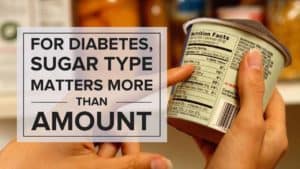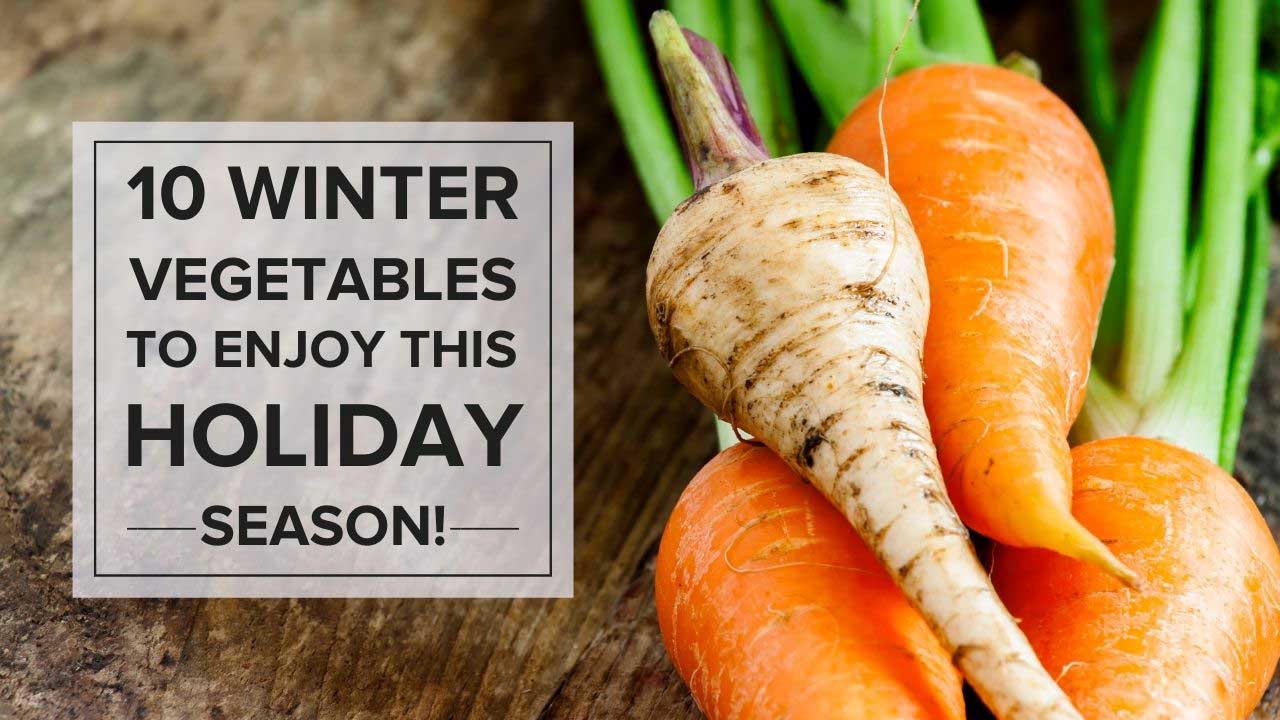
The winter holidays are a time to celebrate with family and friends, and even though we don't necessarily think of greens and veggies, there are actually a number of delicious winter vegetables just waiting to snack on!
Winter is full of fresh produce like winter squash, kale, Brussels sprouts, sweet potatoes, alongside many many more.
This article will explore some of our favorite winter vegetables and how to enjoy them - from soup or chili all the way up to side dishes for your holiday feast!
Plant-Based for the Winter
A lot of people aren't used to the idea of staying plant-based through the winter. Most people are used to the idea of hearty meats, creamy mashed potatoes, and sugar-laden winter treats.
But it's easy to forget that just a few hundred years ago, cold-weather vegetables from the winter garden provided the vast majority of our calories.
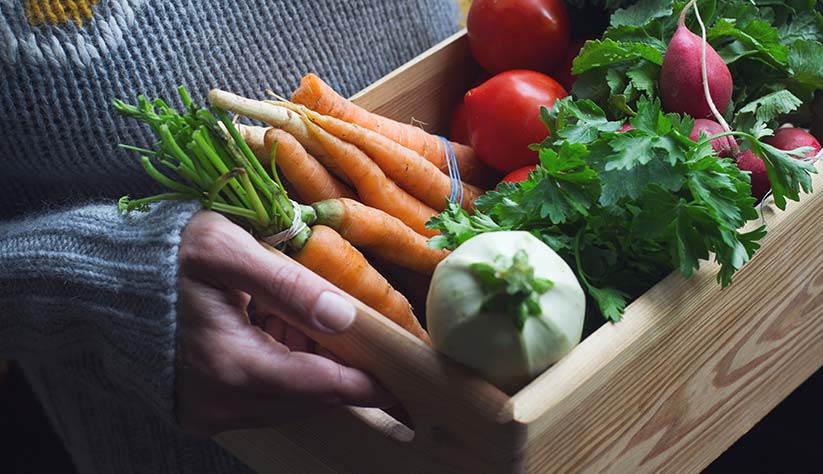
There are dozens of reasons to choose a plant-based diet. These diets avoid the risks associated with eating meats. Plant-heavy diets have been proven to have incredible health benefits on everything from your digestive health to heart health to longevity!
And if you're living with diabetes or insulin resistance, a low-fat, plant-based, whole-food diet is one of the best healthy habits you can adopt. After all, nothing comes close when it comes to helping reverse insulin resistance!
We Get It, It's Not Easy!
But just because it's a good idea to adopt healthy habits like a plant-based diet, that doesn't make it easy!
And just because you might love munching on fruits and cruciferous vegetables in warmer climates and during warmer times of the year, there's definitely something behind the instinct to stock up on hearty, palatable, filling meals in cold weather.
But that doesn't mean you have to resort to milk and heavy cream!

The Hearty Veggies from the Winter Garden
You might think that the winter isn't a great time to be focused on plants, but it actually is! That's because even though some leaves fall from the trees with the arrival of cold weather, and the bushes can seem bare, the truth is that winter crops like root vegetables thrive all winter long.
It's a great time to bring in winter vegetables like winter squash, sweet potatoes, and turnips if you're a home gardener, and it's an even better time to enjoy these cool-weather crops from your local grocery store or farmers markets.
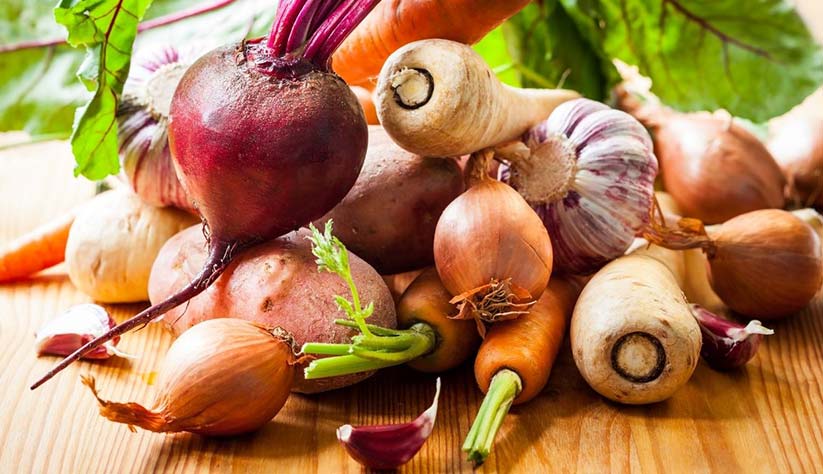
And if you're worried about feeling bored snacking on winter vegetables all winter long, we've got some recipe ideas at the end that'll make you welcome the cooler weather and the rich harvest of the winter garden!
Characteristics of Cold Weather Vegetables
Hearty Flavor
When early winter arrives and brings colder weather and winter rains, most summer crops either die out or go dormant until early spring or even later.
But the winter vegetables that remain are characterized by a hearty density of flavor that some summer crops can't compete with. That's because, in order to protect themselves from the cooler weather, winter crops choose not to expend energy on large leaves or extra growth.
And that means that every ounce of root vegetables, hearty winter greens, or other cold-weather vegetables are packed with flavor, or...

Packed with Nutrients
The other benefit of winter vegetables is that when it comes to their potential health benefits and nutrients, a little bit goes a long way.
That's because the same compounds and nutrients that the plant pulls together to give it all of those complex flavors are also the same nutrients that we (humans) thrive on!
Just think of the difference between a handful of romaine lettuce to a handful of sweet potato, or brussels sprouts.
The summer garden staple certainly has its place on your table, but you know that the winter vegetable is going to give you more bang for your buck.

A Great Meat Replacement
And if there's one thing that you can trust a root vegetable to do, it's to be a great meat replacement! And if you don't believe us, just try a hearty sweet potato and pumpkin stew.
You'll be stuffed to the brim, warmed to the bone, and have all of the key nutrients you need without any of the excess fats or potential nitrates and other harmful compounds.
Great Options for Winter Gardening
And finally, another great aspect of winter vegetables is that they tend to be much simpler to grow at home and tend. After all, winter has harsh weather naturally, so it makes sense that your cold weather sets would be a bit more steady.
Now, we're no experts on the details of floating row cover, cold frames, fall and winter rotations, harvest dates, and garden tips on how to pick up a cover crop or decide on whether or not to go for an extended harvest.
So you might have to go elsewhere to determine when to rotate out your summer garden and start growing collard greens and brussels sprouts.
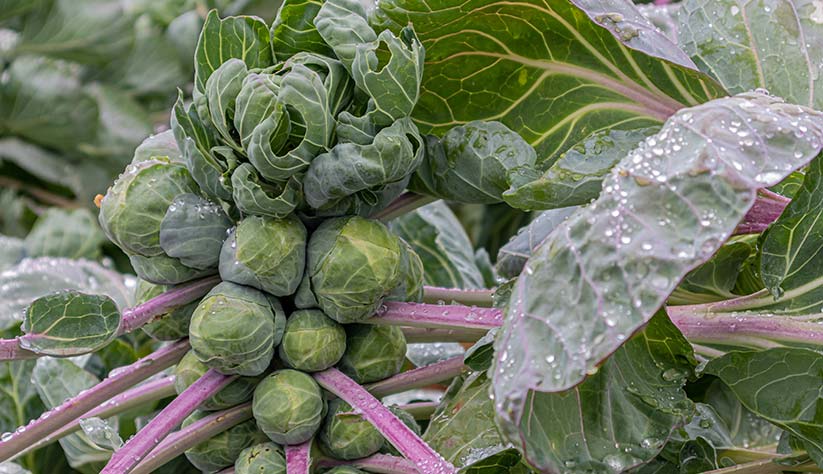
But we are experts in enjoying delicious winter vegetables, and we can't recommend them highly enough!
Shouldn't I Be Nervous of Starchy Foods?
This is a question quite a few people have before we get into the beets and potatoes of our list. Many people who have been struggling to find the truth about their health and bouncing between different diets have heard a few things -- carbs are bad, starches are bad, and fruits will spark your blood sugar and cause weight gain.
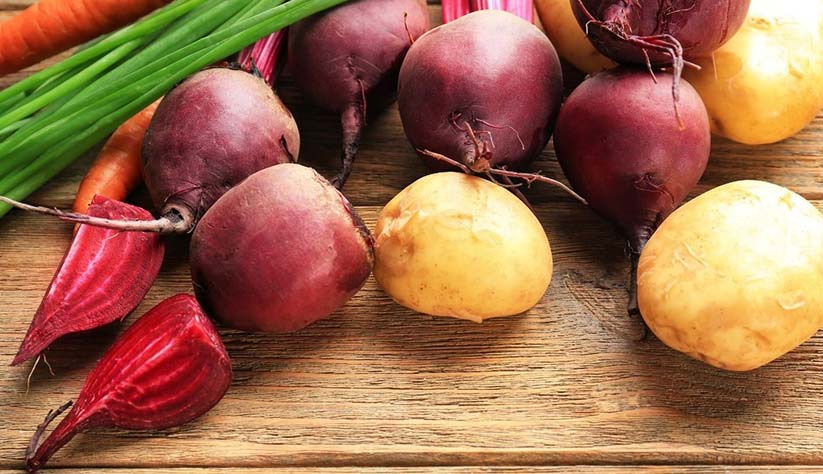
This is especially true for those living with diabetes, who often live in fear of these tasty vegetables.
The Green-Light Method
And while we don't have the time here to get into exactly why you should enjoy fruits and natural carbohydrates (we have an article for that), you should know about their health benefits.
Starches, fruits, and carbohydrates can be damaging if they're in a processed form, like with white bread, candied fruits, and simple carbs like potato chips and processed pasta.
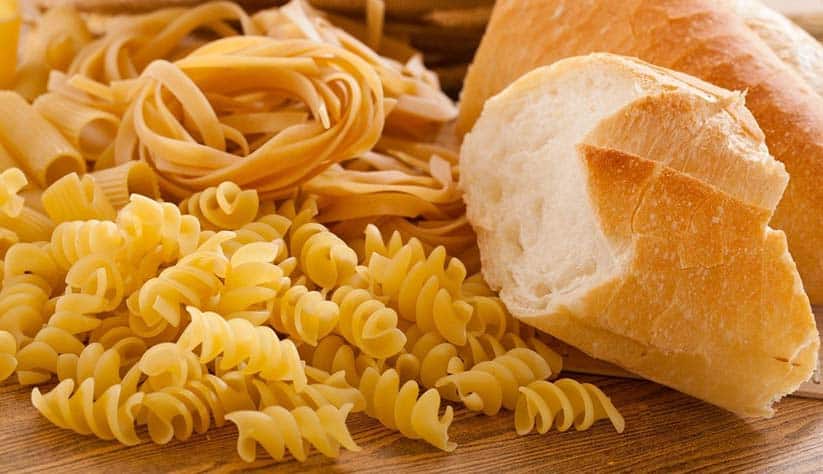
In their natural form, starches, fruits, and carbohydrates are some of the best ways to get the nutrients you need! And in fact, they're fundamental to the green-light guidelines to reversing insulin resistance!
Potatoes, Fruits, Carbs -- If They're Unprocessed, Go Ahead!
But what does that mean for you? Well, if you're snacking on the sweet flavor of a favorite root vegetable, you should be confident that you're making the right choice for your health.
So without further ado, on into our favorite winter vegetables!
Our Favorite Winter Vegetables
Brussels Sprouts
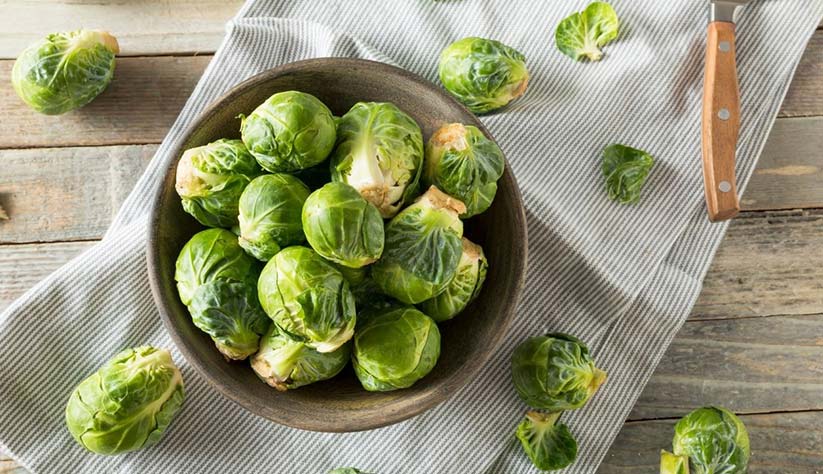
Brussels sprouts get a bad rap sometimes for one reason -- some people don't know how to cook them without leaving a bitter taste! But if you can cook them well, they're a delicious and nutritious winter vegetable.
Not only are brussels sprouts full of key nutrients like vitamin C, vitamin K, and omega-three fatty acids, but they're also a great source of fiber.
In fact, one cup of cooked brussels sprouts contains about six grams of dietary fiber!
Carrots
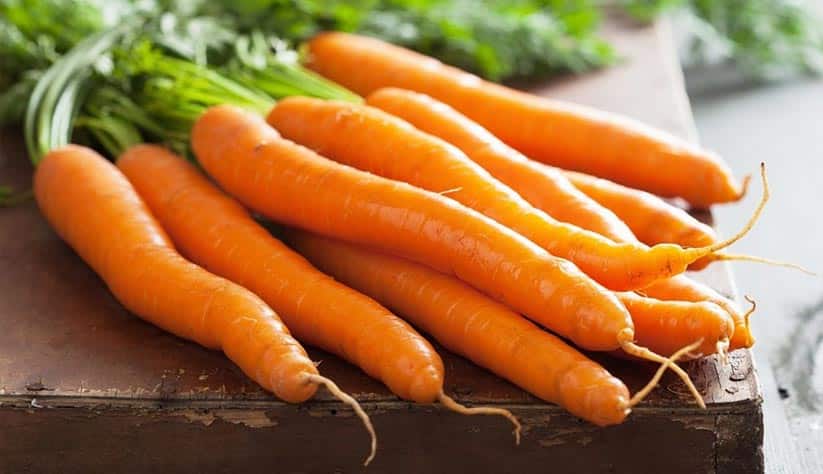
Another classic winter vegetable, the carrot has a little better reputation, and with good reason! Cooked into stews and soups, it's about the best source of natural, plant-based sweetness that you can have, and it's incredibly versatile.
Add in all of its health benefits -- vitamin A, vitamin K, potassium, and antioxidants -- and you've got an understandable popular root vegetable that's hard to beat!
Kale

And now into a leafy green that you have definitely heard of, but might still be skeptical of. Kale is a winter superfood, and it's definitely one of the healthiest vegetables you can eat.
Packed with antioxidants, vitamin C, and fiber, kale is also a great source of calcium. In fact, eating kale provides more calcium than drinking milk!
The key to unlocking the deliciousness of kale is cooking it properly. Kale can be a little tough, so simmering it in broth or stewing it with other vegetables is the best way to enjoy it!
Parsnips
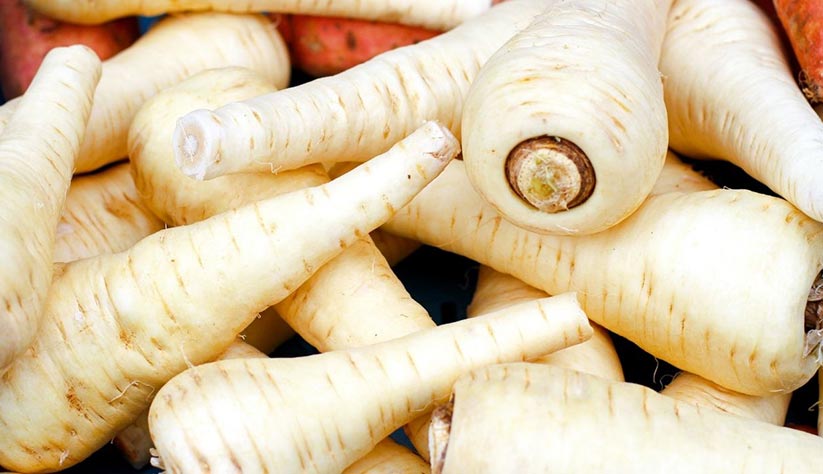
On to another unsung hero -- the parsnip! Parsnips look like white carrots and have a similar taste, and they're just about as versatile too.
And while parsnips don't get as much love as root vegetables like turnips or winter squash, you should definitely take the time to enjoy them!
Parsnips are full of antioxidants and anti-inflammatory properties thanks to their high levels of potassium and vitamin C content, and in our opinion, they're hard to beat as a support player in a stew or front and center in baked root vegetables.
Radishes
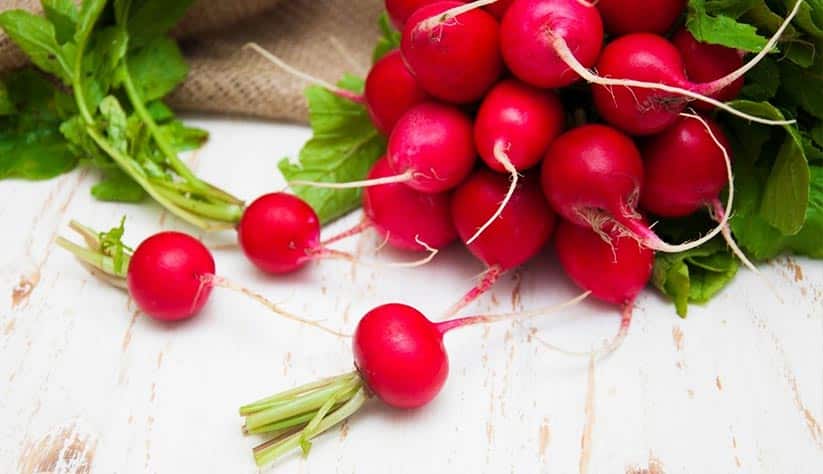
Radishes are one of winter's crunchiest vegetables, and we don't mean that in a snarky way -- they're just crisp!
They won't blow your mind with their nutritional profile since they've got more or less the same vitamins and minerals as carrots or cucumbers, but radishes actually have some antioxidant and anti-inflammatory properties too though.
Like many other vegetables on this, radishes are a great hearty addition to any soup, bowl, salad, or another tasty side, but one sneaky-tasty way to enjoy them is pickled!
Adding just a little bit of vinegar and letting them sit overnight creates a punchy addition to a crunchy wrap!
Beets
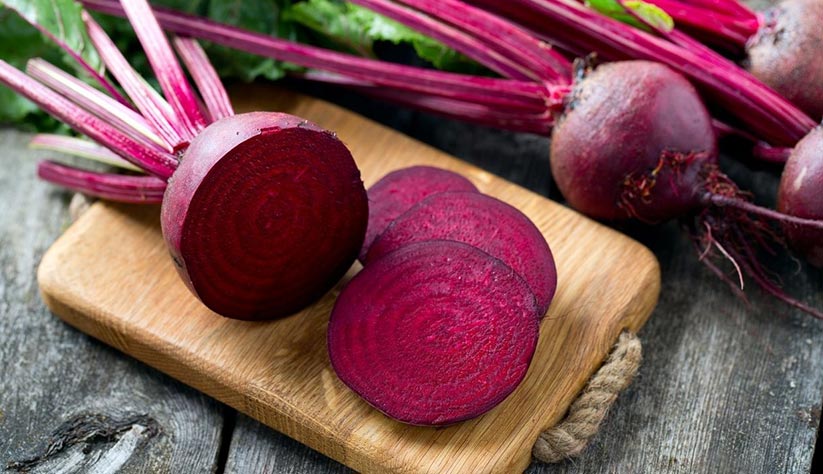
Beets have long been regarded as a nutritional powerhouse, and winter is a great time to enjoy them. Beets are full of antioxidants and anti-inflammatory properties, but they're also a great source of fiber and vitamin C!
You can eat beets raw in salads or pickled for an extra punch of flavor -- but a favorite strategy is actually to enjoy them as part of a smoothie! It's actually been proven that beets boost athletic performance, which is why many competitive athletes include them in pregame routines!
Sweet Potatoes
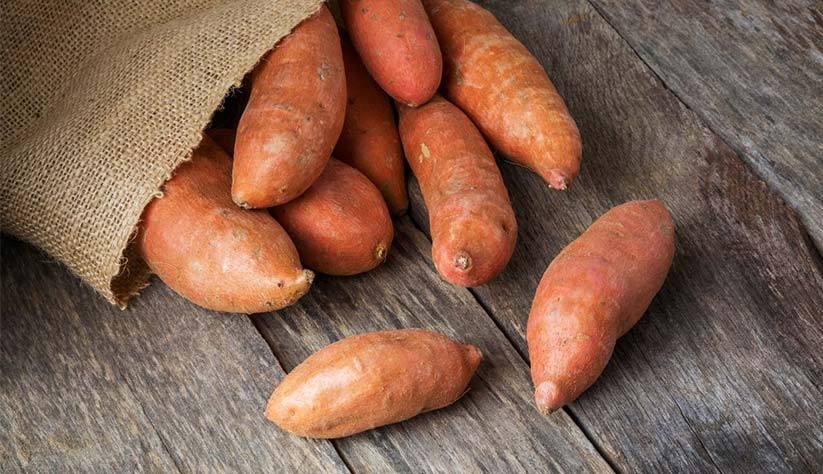
If we had to pick an all-star player from this list of winter vegetables, it would almost certainly be sweet potatoes.
You can add them to nearly any dish and they'll make it better, and they're so sweet and delicious that it's almost hard to believe that they're incredibly good for you!
Just check out our recipes if you don't believe us -- sweet potatoes are a five-tool player!
Collard Greens
And you can't talk winter without collard greens! Collard greens are another winter superfood, and they're packed with calcium, vitamin B-12 (which is very difficult to find in vegan foods), potassium, magnesium -- the list goes on!
Collard Greens can be eaten raw or cooked into soups and stews for an extra dose of winter's best. We especially love using collard greens as a wrap for roasted winter vegetables or other flavorful fillings.
Swiss Chard
And a sibling snack to the collards is swiss chard! Swiss chard is a little less well-known than collards, but it's just as nutritious and delicious!
Swiss Chard is packed with antioxidants, magnesium, potassium, vitamin A -- the list goes on, so it's fair to call this tasty green a superfood!
We love using swiss chard as a bed for roasted winter vegetables or in place of lettuce on sandwiches, and it's a great addition to a winter noodle bowl as well!
Trick Answer: Winter Squash
And the final answer we wanted to include, but couldn't quite? Winter squash! That's because this tricky treat is actually a fruit!
But just because squash doesn't quite make the cut in terms of classification, that doesn't mean this winter superstar shouldn't be all over your winter dinner plates.
It's got a great fleshy texture that makes it an alternative to meats, it plays well as an addendum to hearty winter bowls, it takes on a great crunch in the oven, and you can mash it to your heart's content for a delicious side!
And that's all without hitting on our obvious answer -- soups and stews! Not bad for a fruit masquerading as a vegetable!
Any Vegetables to Avoid?
And as we reach the end of this list, we also wanted to address another question that we get frequently -- are there any vegetables to avoid?
And the answer here is the same as above -- the only vegetables to avoid are ones that are processed or have tons of additives! So avoid canned veggies if you can, and definitely try not to cover your brussels sprouts and collards in bacon and oil (as tasty and tempting as that might be!)
The Final Word
Still though, despite the fact that we don't always think about them first, winter is a great time to enjoy winter vegetables. After all, it's a chance to enjoy seasonal vegetables at their freshest, and stick to your incredibly healthy plant-based habits along the way!
And Tons of Fun Recipes for the Winter
And before we go -- we know that it's one thing to say "yeah, it would be great to enjoy vegetables (and fruits!) during the winter" and entirely another to actually make the change and enjoy them completely.
The gravy, pies, and roasts that come around during the colder times of year are certainly tempting!
And that's why we've put together dozens of fun, tasty, and most importantly hearty plant-based recipes using many of these ingredients, to show you that not only can you eat plant-based during the holidays, you can love it too.
Lower Your A1c and Get to Your Ideal Body Weight ... Guaranteed

Your results are guaranteed. Join more than 10,000 ecstatic members today
Personalized coaching puts you in immediate control of your diabetes health, helps you gain energy, improves your quality of life, and reduces or eliminates your meds.



